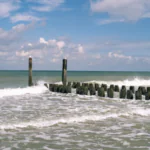1. What is a Blocked Sewer?
A blocked sewer is a common plumbing problem that can cause serious inconvenience and damage if not addressed promptly. A blocked sewer is a blocked pipe that either carries wastewater from the home or drains wastewater from the home’s fixtures, such as the sink, toilet, and shower. When you have a blocked sewer, the wastewater is unable to flow through the pipe and instead pools in the pipe, where it can cause unpleasant odours, backups, and flooding.
2. What Causes Blocked Sewers?
Blocked sewers can be caused by a variety of factors, including roots growing into the sewer line, too much debris, too much grease, and foreign objects. Sewer blockages can also be caused by problems that occur outside of the house, such as broken pipes or collapsed pipes.
3. How to Tell if You Have a Blocked Sewer
There are several signs that indicate you may have a blocked sewer. If you notice that your toilets are not flushing properly, you may have a blockage. You may also notice a strange odor coming from your sinks or other fixtures. If you do not have water draining from your fixtures, it is likely that you have a blocked sewer.
4. How to Clear a Blocked Sewer
If you think you may have a blocked sewer, you should call a professional plumber as soon as possible. A plumber will be able to assess the severity of the blockage and determine the best method for clearing it. Depending on the cause and location of the blockage, the plumber may use specialized tools to remove the blockage or they may need to replace the entire pipe.
5. Prevention Tips for Blocked Sewers
The best way to avoid blocked sewers is to take preventive measures. Make sure to avoid flushing large items down the toilet, such as paper towels, diapers, and feminine hygiene products. Additionally, make sure to avoid pouring grease down the sink or shower drains, as this can cause a blockage. Lastly, have your sewer line checked regularly by a professional plumber to make sure that it is in good working order.
6. What to Do If You Have a Blocked Sewer
If you think you may have a blocked sewer, the most important thing to do is to call a professional plumber. A plumber will be able to assess the severity of the blockage and determine the best method for clearing it. Additionally, the plumber may be able to recommend preventive measures to help avoid future blockages.
7. Common Causes of Blocked Sewers
The most common cause of blocked sewers is tree roots. Trees are drawn to the moisture and nutrients found in sewer pipes, and their roots can easily penetrate the pipes and cause significant blockages. Other common causes of blocked sewers include too much debris, grease, and foreign objects.
8. The Cost of Clearing a Blocked Sewer
The cost of clearing a blocked sewer will vary depending on the severity of the blockage and the method used to clear it. Generally, clearing a blockage with a specialized tool or replacing a section of pipe will be less expensive than replacing the entire pipe.
9. Warning Signs of a Blocked Sewer
If you notice any of the following warning signs, it is likely that you have a blocked sewer: slow-draining sinks and toilets, strange odours coming from the fixtures, gurgling sounds coming from the toilets, and water backing up in the shower or bathtub.
Conclusion
If you think you may have a blocked sewer, the most important thing to do is to call a professional plumber as soon as possible. A plumber will be able to assess the severity of the blockage and recommend the best method for clearing it. Additionally, the plumber may be able to recommend preventive measures to help avoid future blockages.






Comments closed.